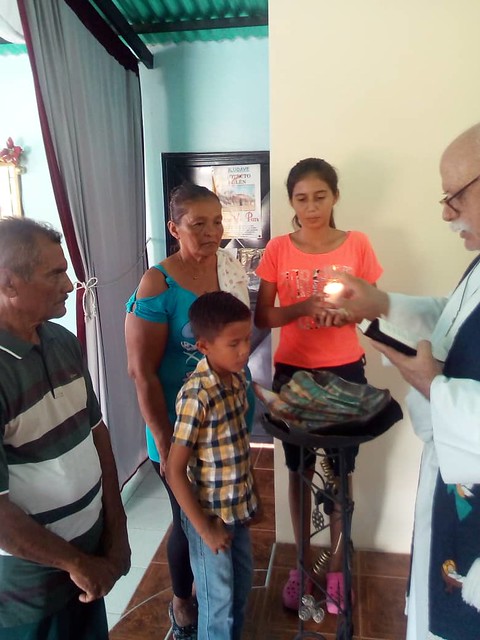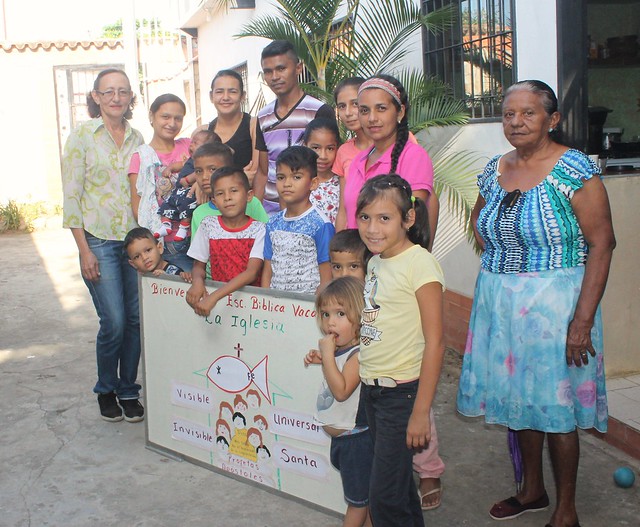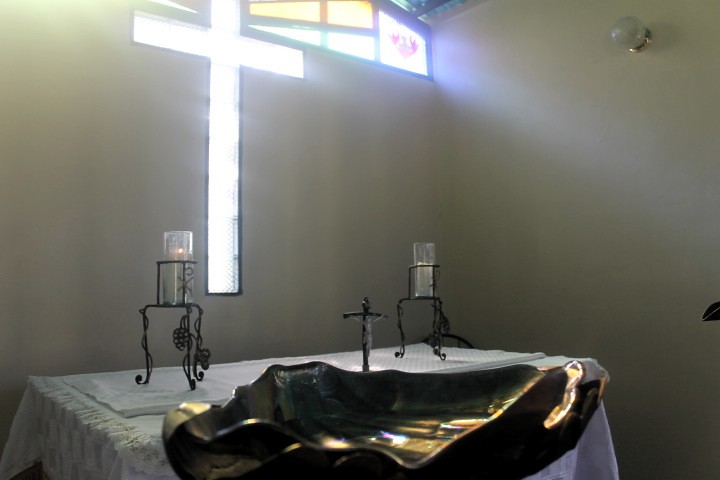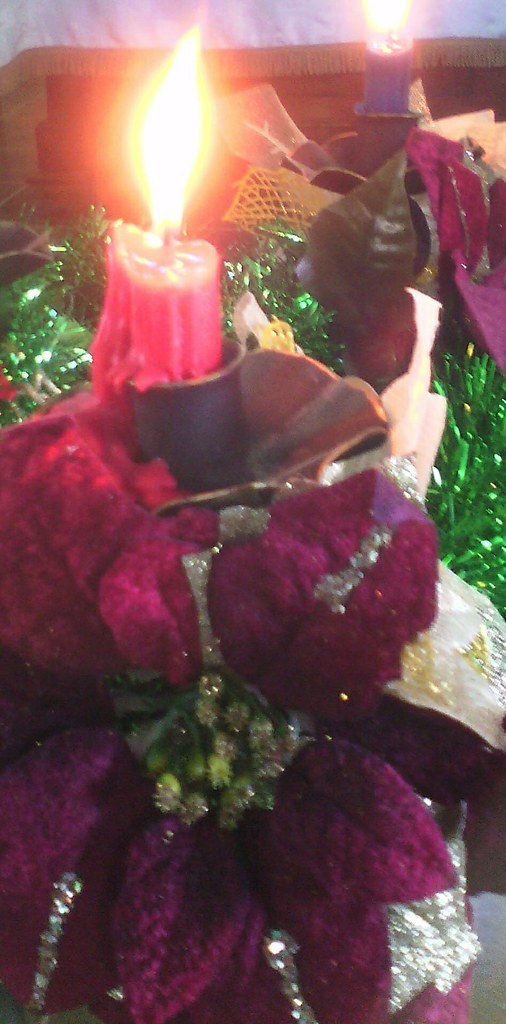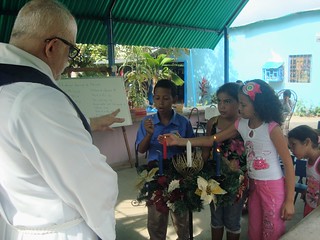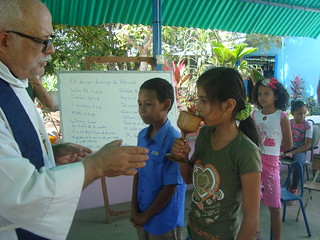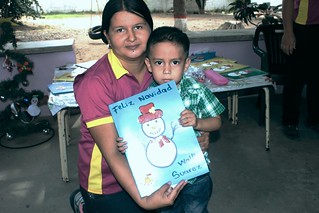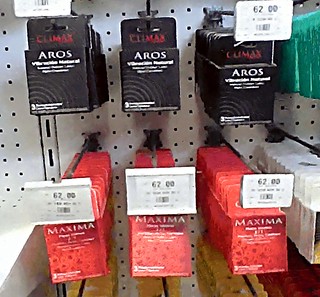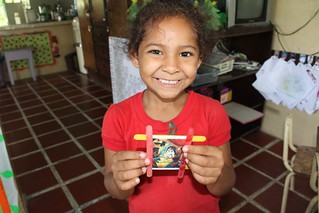We give thanks to God for beginning the season of Advent with our
preschool in operation. The initial announce was for the opening of
schools on October 11, but then the date was changed to October 25.
The preschool was open on a limited basis from late October through
most of November, with the children divided into four groups
attending at different hours on different days.
The ball really got
rolling on Monday, November 23, with a prayer service for preschool
students and their families. The first reading was from Psalm 111:10
“The fear of
the Lord is the beginning of wisdom; all those who obey His
commandments have a good understanding. His praise endures forever!”
The first words of
this verse constitute the motto of the University
of the Andes in Mérida, Venezuela, and our educational center as
well. In the Small Catechism of Doctor Martin Luther, the explanation
of each of the 10 Commandments begins like this: "We must fear
and love God ..." Why should we fear God? First, by the power of
him. Natural forces such as hurricanes, earthquakes or volcanoes are
beyond our control, yet God is more powerful than them. Only by his
Word, God destroyed the world by flood, but by the same Word, he
created heaven and earth. We sinners too must fear God for his
perfect justice by whose standard we are condemned.

Why should we love
God? Moses in the book of Deuteronomy 6: 5 and our Lord Jesus Christ
affirmed it in Matthew 22:37 and Mark 12:30, that the fulfillment of
the first table of the Law, God's will for us to live as his
children, is "You shall love the Lord your God with all your
heart, and with all your soul, and with all your strength." This
is the main commandment, and the second is similar: You shall love
your neighbor as yourself " (Leviticus 19:18).
The second lesson
was Ephesians 6:1-4.
“Children, obey
your parents in the Lord, for this is right. Honor your father and
mother (this is the first commandment with a promise), that it may go
well with you and that you may live long in the land. Fathers, do not
provoke your children to anger, but bring them up in the discipline
and instruction of the Lord.”

The second table of
the Law, which governs our relationships with other human beings
begins with our vocation as children and then as parents. In the
family it is the formation of our attitude towards the authorities.
The first authority figures in our lives are our parents. Our
relationship with them determines our relationships with teachers at
school, high school, and university; with the civil government; and
finally not only with God's representatives in this world, but also
with God himself. Therefore, children should learn the 10
Commandments, the moral law, at home and at school. Because education
is not only knowledge, but also the formation of values and
character.
The Gospel lesson
was Luke 18:15-17.
“And they also
brought the children to him to touch them; but when the disciples saw
this, they rebuked them. But Jesus, calling them, said: "Let the
children come to me, and do not prevent them; for of such is the
kingdom of God. Truly I say to you, whoever does not receive the
kingdom of God as a child, will not enter it."
The fulfillment of
the moral law is the love of God and our neighbor, but, in truth,
only one fulfilled this law perfectly, our Lord Jesus Christ. Not
only in his innocent life, but also in his death on the cross he paid
the debt of our sins. In Christ, God the almighty Father loved us
first, and because of this perfect love and with the help of the Holy
Spirit, we can love God and our neighbor. In holy baptism the Spirit
turns us into redeemed children of God. So, we do not know God as an
angry Judge, but as our heavenly Father and we can pray the Our
Father, the prayer that the Lord taught his disciples (Matthew 6:
9-13; Luke 11: 2-4) And when Jesus He told them, "He who does
not receive the kingdom of God as a child will not enter it", it
is not only an argument for the baptism of children, also for adults,
in baptism and later, not to trust their own understanding, but
submit to the will of God and seek the welfare of others. We confess
the Apostolic Creed to reaffirm our baptismal faith, in the Father,
the Son, and the Holy Spirit.
The prayer service
was followed by games in the street.
A crown of
candles, not thorns
On November 28, the
first Sunday of Advent, we put out the blue paraments and lit the
first candle of the Advent wreath. The reason for the season of
Advent is preparing to celebrate the birth of the Christ. For many
years, Advent was thought of as a time for repentance, fasting and
prayer, much like Lent, but in anticipation of the Incarnation,
rather than the Resurrection. So often churches use purple as the
liturgical color of both Advent and Lent. Purple was a royal color in
antiquity and, as part of their mockery, the Roman soldiers clothed
Jesus in a purple or scarlet (reddish-purple) cloak and crowned him
with thorns (Matthew 27:28-29; Mark 15:17; John 19:2).
Blue also is a royal
color, especially the deep, rich shade known as “royal
blue” which is very close on the spectrum to purple. The use
of blue as an alternative liturgical color for Advent has its roots
in Sweden, England and Spain. Advent
blue is thought of as the color of the sky just before the first
rays of dawn appear on the horizon.

The Advent wreath is
called “la corona de Adviento” or “Advent crown” in Spanish,
which reminds one of the crown of thorns. But the wreath or crown of
Advent, since its origins in Germany, always been a circle of
evergreen branches and candles. The circle also recalls the infinite
mercy of the triune God that has no beginning and no end. The green
branches signify the new life in Jesus Christ. The four candles
represent the four Sundays of Advent. One of the candles is lit on
the first Sunday of Advent, then a new candle every Sunday until the
last Sunday with all of them lit. Many times the color of the third
candle is pink, because its Sunday is the midpoint of the season. A
white candle inside the circle that is lit on Christmas Eve to
symbolize the light of Christ in this world.
And, of course, we
set out the Nativity scene, or pesebre, as it is known in Venezuela.
In the 13th Century, Francis of Asissi put together what we would
call today a living Nativity scene. People began making models of
this scene for their homes with figures of wood or clay. This custom
spread from Italy throughout Europe, but particularly gained a
foothold in Spain. From there it spread to Spain’s colonies in the
Americas. We follow the Venezuelan practice of not placing the Christ
Child in the scene until Christmas Eve.
Pray for
Venezuela
We also give thanks
that on November 21, nationwide
gubernatorial and municipal elections were carried out with no
violent repercussions. Only the
results of the governor’s race in our state of Barinas were
disputed. Meanwhile, according to a
United Nations Food and Agriculture Organization (FAO) report,
Venezuela
is second only to Haiti as the Latin American country with the
highest percentage of hungry people. Haiti and other French-speaking
nations of the Caribbean are considered part of Latin America because
French, like Spanish and Portuguese (spoken in Brazil) are Romance
(“Romanish”) languages derived from Latin dialects.
Lord God, make
Advent a blessing to us as we prepare our hearts to welcome the
Christ Child anew. Amen.

 Luz Maria and I are grateful for the opportunity to speak via Zoom on December 4, 2025, to the students of Deshler Lutheran School, Deshler, Nebraska. Our special thanks to principal Todd Voss; Brian Francik, pastor of St. Peter’s Lutheran Church, Deshler; and José Flores, pastor of Trinity Lutheran Church, Friedensau, Nebraska. Deshler Lutheran School is one part of the ministry conducted by St. Peter-Deshler and TrinityFriedensau. Both congregations have a rich tradition of providing Christ-centered education. Trinity Lutheran at Freidensau called the first teacher to the Nebraska District in 1879. St. Peter's Lutheran School was established in 1889. In 1966, Trinity-Friedensau and Bethlehem Lutheran Church of Kiowa joined with St. Peter's-Deshler to form the Deshler Lutheran School Association using the 1953 building and grounds in Deshler for its campus. Trinity-Friedensau celebrated its 150th anniversary last year. I attended the centennial anniversary in 1974 which featured my father’s older brother, the Rev. Alfred Ernst, as guest speaker. My great-grandfather, Henry Schabacker, so far holds the longest tenure as pastor of Trinity-Friedensau, having served for more than 30 years. His daughter, Theodora Amanda, married my grandfather, David Julius Ernst, who was the sole teacher in the parochial school and also church organist.
Luz Maria and I are grateful for the opportunity to speak via Zoom on December 4, 2025, to the students of Deshler Lutheran School, Deshler, Nebraska. Our special thanks to principal Todd Voss; Brian Francik, pastor of St. Peter’s Lutheran Church, Deshler; and José Flores, pastor of Trinity Lutheran Church, Friedensau, Nebraska. Deshler Lutheran School is one part of the ministry conducted by St. Peter-Deshler and TrinityFriedensau. Both congregations have a rich tradition of providing Christ-centered education. Trinity Lutheran at Freidensau called the first teacher to the Nebraska District in 1879. St. Peter's Lutheran School was established in 1889. In 1966, Trinity-Friedensau and Bethlehem Lutheran Church of Kiowa joined with St. Peter's-Deshler to form the Deshler Lutheran School Association using the 1953 building and grounds in Deshler for its campus. Trinity-Friedensau celebrated its 150th anniversary last year. I attended the centennial anniversary in 1974 which featured my father’s older brother, the Rev. Alfred Ernst, as guest speaker. My great-grandfather, Henry Schabacker, so far holds the longest tenure as pastor of Trinity-Friedensau, having served for more than 30 years. His daughter, Theodora Amanda, married my grandfather, David Julius Ernst, who was the sole teacher in the parochial school and also church organist.
















